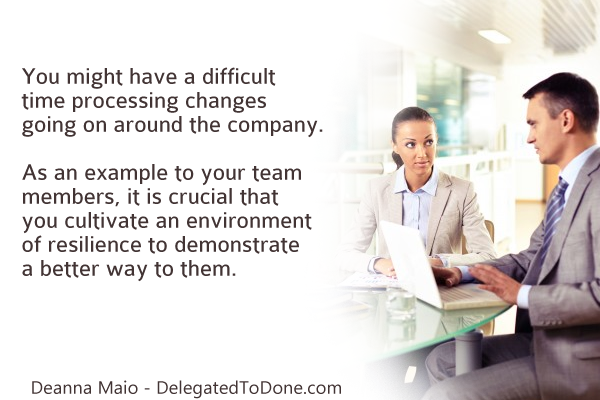If you stay employed at a company for any length of time, you will experience a change or two. How long you stay with the company depends on your view of these changes. We know that every change begins a cycle that gets harder before it gets easier. While you may not have any control over the external transitions, you do have control over your response to them.
Bending without Breaking
This is the definition of resilience. The only thing that we ever have control over is our response to the changes that occur around us. As a manager, expect that team mates may exhibit certain emotional states at each stage. You might have a difficult time processing changes going on around the company. As an example to your team members, it is crucial that you cultivate an environment of resilience to demonstrate a better way to them.
The Resilient Response involves preparation at each stage in the change cycle. In the Stability stage, the importance is on planning for changes when none are on the horizon. You can think clearly and act surely in advance of any difficulty. Some examples include:
- Strengthen existing systems – making changes to a system that works but might have some bugs could prevent major upheaval later.
- Implement flexible processes – create flexible elements to current systems so they can change with the times.
- Be ready to shift gears – you may not want change but being prepared for it prevents being caught off guard.
- Expect changes – it is inevitable.
- Demonstrate resilience – stay ready by taking care of yourself so you can handle stress better.
During the Change stage, things are happening that are beyond your control. How can you handle it?
- Acknowledge what’s being left behind – acknowledge that you were comfortable with the old process.
- Celebrate it – we are talking about the old. Remember the old and gain closure before the new comes.
- Get up to speed – gather all the intelligence that you can on the coming changes.
- Acknowledge your feelings – sure you will be disappointed by transition, but don’t let it consume you.
- Change your mindset – instead of complaining, find ways to assuage your uncertainty.
Now we enter the Instability stage. Any number of things is going on now, including chaos. Handle it this way:
- Collect more info – find out what and why the changes are so you can process them.
- Who is making the change? – Get the inside scoop.
- Leave the old way behind – decide that it is time to move on.
- Move forward with an open mind – set new goals for you.
The last stage is Rebalancing. It’s time to return to an easier state. Try this:
- Explore new ideas – look to the change as a good thing and seek proactive ways to help.
- Plan – set a course that will put you on a stable path again.
- Take action – don’t just let things happen to you. Take an active role.
- Gain a positive outlook – notice the hope and optimism creep back into your work life.

